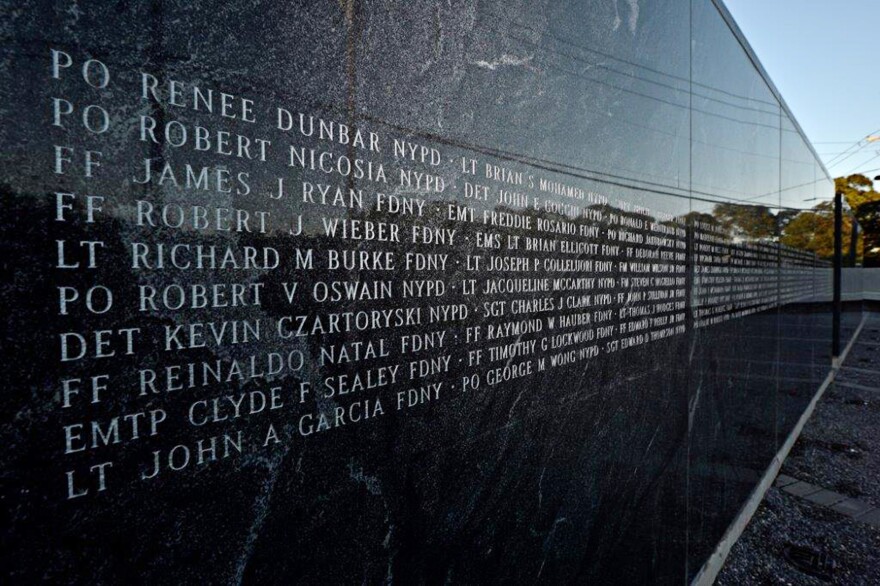A stack of folders with the names of construction workers, police and firefighters, and volunteers rests at John Feal's feet. In his tidy home office in Nesconset, N.Y., Feal checks their spelling before he can send names to the engraver, who will put them on his memorial wall.
One of Feal's feet was crushed by 8,000 pounds of steel as he dug through the rubble of the World Trade Center. He considers himself blessed to have months in the hospital while other Sept. 11 responders inhaled toxic dust on the job.
Now, Feal devotes himself to keeping up what's thought to be the only memorial for people who died of illnesses tied to work at ground zero.
"So now I'm working on the fatalities list, those who are going on the wall," he says.
Feal spends 10 hours a day vetting responders for inclusion on the wall. He reads obituaries and talks to families of those who died.
"It's like walking on glass barefoot," he says. "For not getting a salary and for not getting paid, my job sucks, you know? Because I got some tough questions to ask."
Questions, such as, can the family prove that the responder died of a disease linked to Sept. 11?
"I'm not the Baseball Hall of Fame," he says. "We're not trying to keep people out. We only care that they were at ground zero. They were being treated for a [Sept. 11]-related illness that was certified, and that they had a [Sept. 11 Victims Compensation Fund] claim."
Federal claims help responders treat nearly 70 cancers linked to exposure to ground zero. The World Trade Center Health Program has diagnosed 40,000 so far. Feal says getting injured at the site early on may have saved him.
"If I never got hurt, I would have worked the whole 10 months down there," he says. "And, who knows, maybe I woulda got sick. I'm lucky. I'm blessed. I pale in comparison. I am so minute and so small to these men and women. Hence why I do what I do."
He feels a duty to care for the Sept. 11 community when federal programs fall short. So Feal helps organize golf fundraisers to support families left to cover medical bills, funerals, and the loss of livelihood.
Before tee off at a recent fundraiser, Feal meets with his friend Michael Barasch, whose law office represents more than 2,500 sick responders with their claims.
"This is a real epidemic now," Barasch says. "It's heartbreaking to hear stories of people who have passed away. Friends of mine."
Barasch and Feal fought Congress for more federal funding when the Victim's Compensation Fund couldn't accept any more applications. The VCF paid 9,000 claims to the first group of claimants and is processing about 5,000 applications for the second.
"Our frustration is based on seeing people get sicker and die waiting for the help that was supposed to come from the federal government," Feal says.
Jennifer McNamara is still waiting for a wrongful death claim on behalf of her husband, who worked at the New York Fire Department. He died seven years ago, before the VCF was started.
McNamara and others like her find some closure at the 9/11 Responders Remembered Memorial Park in Nesconset, N.Y. At a busy intersection, rows of shrubs and American flags separate a sushi restaurant from the memorial. Three polished granite walls named Courage, Honor and Sacrifice stand engraved with the names of more than 700 responders. McNamara visits the name of her late husband, John.

"When you look at this wall and when you look at the, unfortunately, the ever growing number of names, you realize how much you're not alone," she says.
McNamara says this memorial brings together a larger Sept. 11 community.
"I see the names of so many widows, that I have become friends with as a result of this, and you realize that ... we've all fought this battle," she says.
John Feal says the Sept. 11 community will continue helping Jennifer McNamara and the families of other responders who died — long after their names appear on the memorial.
Copyright 2021 WSHU. To see more, visit WSHU. 9(MDAyMjQ1NzYwMDEyMjU5MjA0MjE0Yzg1Mg004))






